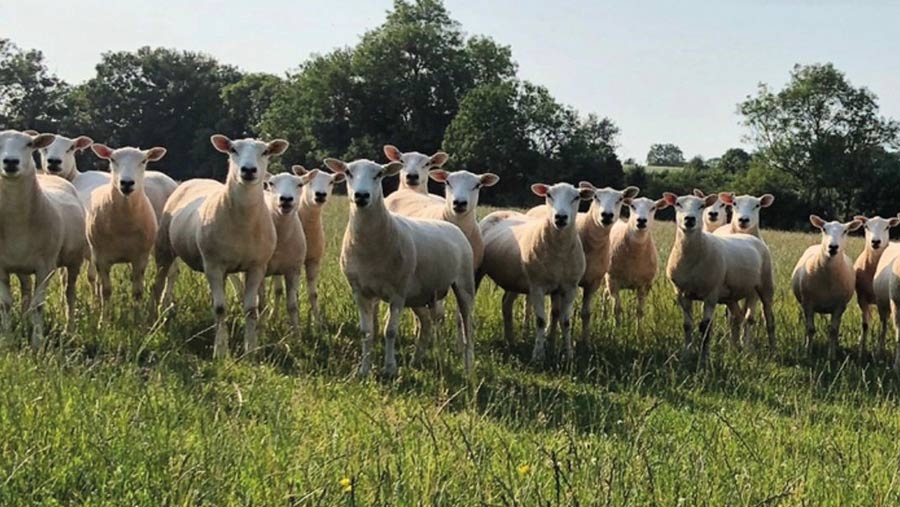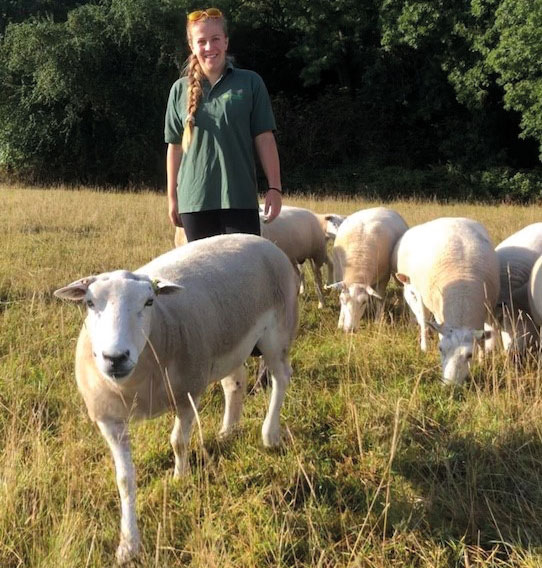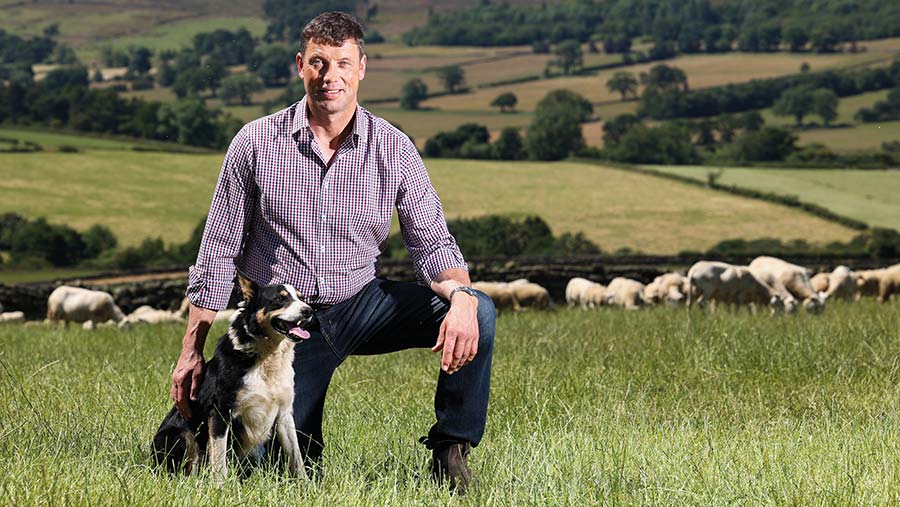Love Lamb Week returns to help revitalise red meat sector
 Sheep farmer and Love Lamb Week supporter Amy Matravers' Lleyn flock © Amy Matravers
Sheep farmer and Love Lamb Week supporter Amy Matravers' Lleyn flock © Amy Matravers Farmers have been asked to show their support for the annual Love Lamb Week, which returns next week to promote the UK sheep sector and encourage consumers to buy British produce.
In response to increasing market competition from free-trade deals struck by the government, and continued pressure from the anti-meat lobby, farm groups want to see widespread support for this year’s campaign.
Returning for its eighth year, the week will run from 1-7 September, focusing on the “naturally delicious” taste of lamb and explaining why the UK is ideal for sustainable production, due to the country’s climate and landscape.
Love Lamb Week was established in 2015 by Cumbrian sheep farmer Rachel Lumley in response to poor lamb prices and low domestic consumption.
See also: Tips to keep farms profitable in face of rising inputs
Ms Lumley was well-known as someone passionate about British lamb, and her death in 2020 was a shock for the whole industry.
The National Sheep Association (NSA) and the UK’s farming unions and meat levy boards are among the industry groups backing the popular campaign.
‘Crucial campaign’
Phil Stocker, chief executive of the NSA, says the campaign is crucial to promote the sheep sector and create a better future for farm businesses.
“It is really important and valuable for the industry to have a period of time where we can really celebrate one of the most natural products that we produce, and get a positive message out there,” he says.
“The effects of these campaigns are long-lasting. With trade deals and pressures on the market, we’ve got an opportunity to promote our domestic lamb at a time when we are at risk of more imports coming in.”
Mr Stocker welcomed the young farming ambassadors who are promoting British lamb to young consumers (See “Making the case for affordable lamb”).
“It is really important we turn the younger generations on to lamb and show how healthy and nutritious it is, plus how sustainable and versatile it is to cook with,” he says.
The success of the campaign has led to increasing retailer support. This year, Tesco, Sainsbury’s, Asda, Morrisons, Co-op, Aldi and Lidl will all promote British lamb throughout the week to consumers.
More than 350,000 on-pack stickers will be placed on British lamb products in stores, and there will be online banners. There will also be recipe cards available to show shoppers how to make quality and affordable meals using various lamb cuts.
“It is really encouraging to see the supermarkets getting behind this and promote traditional red meat in this way,” says Mr Stocker. “For a long time we feel we’ve been challenged by the growth in the meat-alternatives market.”
Five ways to support Love Lamb Week
- Order your free marketing assets from the AHDB. It has recipe leaflets, posters, farmgate banners and sticker sheets to help promote Love Lamb Week.
- Follow the Love Lamb Week social media accounts – @LoveLambWeek on Twitter and Facebook and @lovelambuk on Instagram
- Share photographs of your delicious lamb meals. Use #LoveLamb and #LoveLambWeek on social media. You can also tag the Love Lamb account in your posts
- Show your support by displaying the Love Lamb “Twibbon” across your profile picture on Facebook and Twitter. Follow these simple steps to add yours.
- Tell your farming story and help promote UK lamb. Use social media to share updates on your work on the farm and to talk about the sustainability of UK lamb production.
Export growth
As well as the domestic market, John Royle, chief livestock adviser at the NFU, says Love Lamb Week is a timely boost to help the sector promote its high-quality produce abroad, with exports expected to grow 20% this year compared with 2021.
“The export trade has remained positive with volumes maintained into our closest market, the EU. Other markets are growing and new ones are being opened up that will hopefully provide further opportunities for the sector,” Mr Royle says.
“For example, the US market is expected to open up for British lamb later this year and we’re seeing increasing volumes being exported to the Gulf states.”
A new collection of marketing merchandise, including farmgate banners, has been created by the AHDB to encourage producers, butchers and retailers, as well as the wider industry, to celebrate British lamb.
Making the case for affordable lamb
Leicestershire tenant sheep farmer Amy Matravers is supporting Love Lamb Week from her family farm in East Leake, near Loughborough.

Sheep farmer Amy Matravers © NSA
The 28-year-old is a National Sheep Association ambassador and farms with her husband, James, and parents Graeme and Viv.
Ms Matravers is passionate about promoting British lamb and telling consumers why the UK is the ideal place to produce the meat.
The family have about 250 Lleyn ewes and 100 Dorset ewes at the organic Manor Farm, with lambing taking place in September, February and March.
The lamb is all butchered and sold on site, through the farm shop.
She says lamb sales surged during the Coronavirus pandemic, but have dropped since the cost-of-living crisis took hold.
“When people think of lamb they often think of the big joints, but now is a good opportunity to promote the cheaper cuts for recipes, like mince, that are maybe more affordable for people,” she says.
“It is great to promote sheep farmers. There are so many of us in the country and if we can all do a bit to sell more lamb, then it helps keep us going.”
Opinion: Richard Findlay, NFU

Richard Findlay, livestock board chairman, NFU © NFU
Even as my sheep graze on the North Yorkshire moors, I can’t help but think about the huge challenges the red meat sector is facing.
Like every other farmer across the country, my farm hasn’t escaped the crippling costs of feed, fertiliser and fuel, and I am acutely aware of what that might mean for the public as the cost-of-living crisis continues to bite.
I can’t remember a time when we were fighting so many battles on so many fronts.
While the liveweight lamb price is currently 50p/kg above the five-year average, any margin this might have previously given us is being totally eclipsed by the rate at which our costs of production are rising.
Defra stats to May 2022 show an overall increase in total input costs of 29% compared with a year earlier.
Coupled with the seasonal decline in price since mid-June, lamb values are also now under significant pressure.
The drought has added to this, slowing the volumes of lambs coming forward.
The concern here is that we could see an influx of animals coming forward later in the year, potentially putting even more pressure on price.
Given all these issues, Love Lamb Week has never been more needed than it is right now. It is a great opportunity to show the public that British lamb, with its quality, unique taste and sustainable production methods, is worth the investment.
Retailers and food service businesses have a huge part to play in the promotion of home-grown lamb.
That’s why we’re urging retailers to honour their sourcing commitments, champion British lamb produced to world-leading standards, and support their suppliers.
Levy payer investment in targeted campaigns, such as Love Lamb Week, and the wider We Eat Balanced campaign, are vitally important for the whole supply chain, to help promote the benefits of eating red meat as part of a healthy, balanced diet.
And just as the supply chain, retailers and food service must play their part, farmers too must do what we can to keep the market operating as smoothly as possible.
Crucially, we must maintain the quality of the product. The whole point of Love Lamb Week is to promote delicious, versatile, climate-friendly food.
So even as pressure mounts with lack of grazing and forage, we must do what we can to hit market specifications and avoid sending under-finished lambs.
I believe we have a bright future supplying quality lamb to both domestic and international customers, but farmers need confidence in the sector.
The NFU is launching an intentions survey to determine what plans livestock farmers are making for the coming year and I urge as many people as possible to take part.
The more we understand the intentions of the sector and where confidence is at, the better we can inform the supply chain and policymakers and ensure they make decisions that back British lamb.”
Richard Findlay
NFU livestock board chairman
Love Lamb Week partners
AHDB, Hybu Cig Cymru (Meat Promotion Wales), LMC Northern Ireland, NFU, NFU Scotland, National Sheep Association, National Trust, Quality Meat Scotland, Red Tractor, Tenant Farmers Association, Ulster Farmers’ Union
